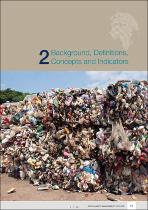JavaScript is disabled for your browser. Some features of this site may not work without it.
- ResearchSpace
- →
- Research Publications/Outputs
- →
- Book Chapters
- →
- View Item
| dc.contributor.author |
Osibanjo, O

|
|
| dc.contributor.author |
Godfrey, Linda K

|
|
| dc.date.accessioned | 2019-01-25T08:06:37Z | |
| dc.date.available | 2019-01-25T08:06:37Z | |
| dc.date.issued | 2018-06 | |
| dc.identifier.citation | Osibanjo, O. and Godfrey, L.K. 2018. Background, definitions, concepts and indicators. In: Africa Waste Management Outlook, pp. 11-20. Nairobi: United Nations Environment Programme | en_US |
| dc.identifier.isbn | 978-92-807-3704-2 | |
| dc.identifier.uri | http://wedocs.unep.org/bitstream/handle/20.500.11822/25514/Africa_WMO.pdf?sequence=1&isAllowed=y | |
| dc.identifier.uri | http://wedocs.unep.org/handle/20.500.11822/25514 | |
| dc.identifier.uri | http://hdl.handle.net/10204/10646 | |
| dc.description | Chapter published in Africa Waste Management Outlook, pp. 11-20 | en_US |
| dc.description.abstract | The Africa WMO provides the first comprehensive analysis of waste management on the African continent. It forms part of a series of regional waste management outlooks prepared by the United Nations Environment Programme (UNEP). These regional outlooks stem from the GWMO, which provided a comprehensive global overview of the state of waste management around the world (UNEP 2015). Acknowledging waste management as a political priority for Africa (chapter 1), the Africa WMO explores the current drivers of and pressures on waste generation in Africa. It attempts to quantify the state of waste generation, recycling and disposal on the continent and the associated impacts of poor waste management on human health and the environment (chapters 3, 4 and 5). In line with international trends, the Africa WMO unpacks the socio-economic opportunities of waste-to-wealth and employment creation and poverty alleviation in Africa, recognizing the critical role of the informal sector in the waste management value chain (chapter 6). Finally, delving into the appropriateness of social and technological innovation for Africa (chapter 7) and the financing of waste management infrastructure investment (chapter 8), the Africa WMO provides a response of proposed solutions and recommendations to address the waste management challenges facing Africa (chapter 9). | en_US |
| dc.language.iso | en | en_US |
| dc.publisher | United Nations Environment Programme | en_US |
| dc.relation.ispartofseries | Worklist;21894 | |
| dc.subject | African waste management | en_US |
| dc.title | Background, definitions, concepts and indicators | en_US |
| dc.type | Book Chapter | en_US |
| dc.identifier.apacitation | Osibanjo, O., & Godfrey, L. K. (2018). Background, definitions, concepts and indicators., <i>Worklist;21894</i> United Nations Environment Programme. http://hdl.handle.net/10204/10646 | en_ZA |
| dc.identifier.chicagocitation | Osibanjo, O, and Linda K Godfrey. "Background, definitions, concepts and indicators" In <i>WORKLIST;21894</i>, n.p.: United Nations Environment Programme. 2018. http://hdl.handle.net/10204/10646. | en_ZA |
| dc.identifier.vancouvercitation | Osibanjo O, Godfrey LK. Background, definitions, concepts and indicators.. Worklist;21894. [place unknown]: United Nations Environment Programme; 2018. [cited yyyy month dd]. http://hdl.handle.net/10204/10646. | en_ZA |
| dc.identifier.ris | TY - Book Chapter AU - Osibanjo, O AU - Godfrey, Linda K AB - The Africa WMO provides the first comprehensive analysis of waste management on the African continent. It forms part of a series of regional waste management outlooks prepared by the United Nations Environment Programme (UNEP). These regional outlooks stem from the GWMO, which provided a comprehensive global overview of the state of waste management around the world (UNEP 2015). Acknowledging waste management as a political priority for Africa (chapter 1), the Africa WMO explores the current drivers of and pressures on waste generation in Africa. It attempts to quantify the state of waste generation, recycling and disposal on the continent and the associated impacts of poor waste management on human health and the environment (chapters 3, 4 and 5). In line with international trends, the Africa WMO unpacks the socio-economic opportunities of waste-to-wealth and employment creation and poverty alleviation in Africa, recognizing the critical role of the informal sector in the waste management value chain (chapter 6). Finally, delving into the appropriateness of social and technological innovation for Africa (chapter 7) and the financing of waste management infrastructure investment (chapter 8), the Africa WMO provides a response of proposed solutions and recommendations to address the waste management challenges facing Africa (chapter 9). DA - 2018-06 DB - ResearchSpace DP - CSIR KW - African waste management LK - https://researchspace.csir.co.za PY - 2018 SM - 978-92-807-3704-2 T1 - Background, definitions, concepts and indicators TI - Background, definitions, concepts and indicators UR - http://hdl.handle.net/10204/10646 ER - | en_ZA |






